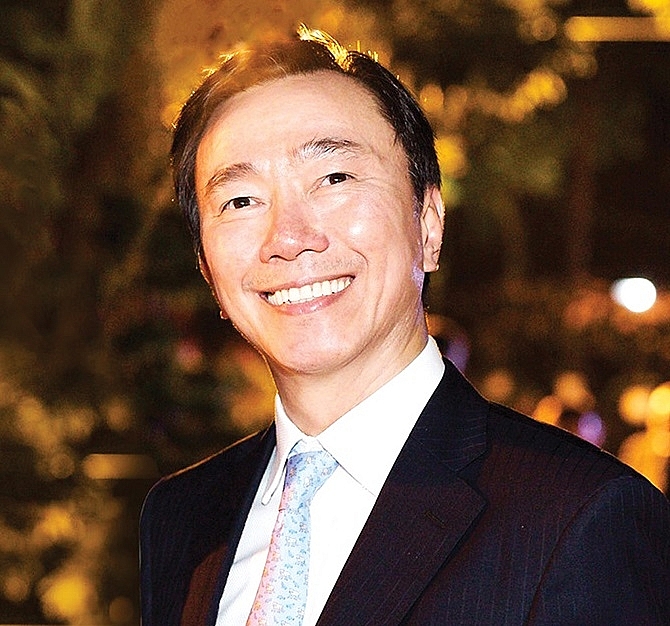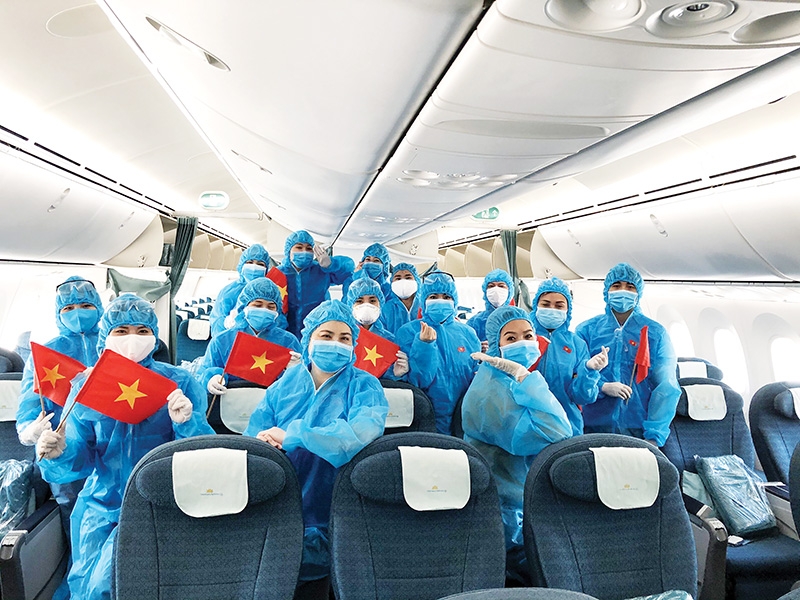From the outside looking in: citizens abroad during crisis
 |
| Vietnam’s Ambassador to India Pham Sanh Chau |
Even though the Indian government has already begun its large-scale COVID-19 vaccine campaign, Vietnam’s Ambassador to India, Pham Sanh Chau, did not have the opportunity to preside over the marriage ceremony for his only daughter.
Sadly, the most memorable thing for Ambassador Chau was the moment when he learnt that 22 officials and staff of the embassies of Vietnam and India, as well as 18 of their relatives, tested positive for the virus after their repatriation. Despite this complication, the ambassador carried on fulfilling his responsibilities as best he could.
Repatriation charity
India reported its first COVID-19 case last January, and the government almost immediately shut down all schools, public services, and subways in the cities, as well as suspended international flights. After coping with the lockdown for three gruelling months, Buddhist nun Huyen Tam decided to return to Vietnam.
As with Tam, the pandemic moved tens of thousands of overseas Vietnamese to try to return to their home country, but only a handful of flights were available as the Vietnamese government decided to close borders and adopt social distancing measures. Later, the government allowed some citizens from India to return home, on a registration and selection basis.
Several other monks and nuns who came earlier to India from Buddhist temples and institutes across Vietnam could not afford the tickets to return, leaving them to rely on good will rather than money. One of them was reported to have only VND1.5 million ($65) in his pocket, as well as another $50 from a loving supporter.
With tickets to Vietnam costing up to $1,000, many were forced to pinch every penny if they decided to return home. Fares for flights operated by the embassy continue to fluctuate, depending on the number of passengers, leaving many stranded and desperate.
“The pandemic is bad, no question, but there is one good thing I can take from it,” said Ambassador Chau. “It helped me to better grasp the picture of Vietnamese living in India, or more precisely, being neglected in India.”
The ambassador referred to the stark difference in the lives of Vietnamese in India compared to other communities like in France or Belgium, where he used to work before. “It is also very different from the Vietnamese community in Eastern Europe,” which Chau also knows quite well as his sister and nephew are living there.
The ambassador and his colleagues at the embassy witnessed the concerns of Vietnamese in extremely difficult circumstances. If they stay in India, they will have no jobs, no accommodation, and no food as India has just been hit by a fourth wave of infections, with an average of 5,000 people being tested positive each day.
Although Ambassador Chau can look back on nearly 40 years of diplomatic work in foreign countries, he said he had probably never been more associated with consular work and citizen protection than now as he feels personally responsible for the fates of many.
The ambassador decided to organise a small charity within the diplomatic missions in India to gather enough money for 15 domestic and five international plane tickets, as well as offset part of the airfare for an additional 15 tickets to support some of the people who have been desperately wanting to return home.
Chau recalled, “On the first day of the repatriation, Vietnam Airlines sold 300 tickets to special customers who needed to return home according to a list approved by the government.”
The embassy requested authorisation for more people to return and received permission to sell an additional 30 tickets, with the last 14 meant for a delegation returning from Nepal to Vietnam, under the condition that India would issue last-minute transits for these people.
However, despite the efforts of the ambassador and the Vietnamese embassy in India, difficulties abounded. With only two days before take-off, the embassy was still waiting for permission for the plane to fly through the airspace of Myanmar and Bangladesh. Meanwhile, the embassy had signed a contract to lease three domestic flights from local low-cost airline IndiGo but had yet to receive permission from the Indian authorities to proceed with these flights.
The repatriation from India amid the pandemic was a particularly complicated journey, involving around 340 people who travelled tens of thousands of kilometres across 15 states with 66 cars and three special jets to reach their final destination, the New Delhi airport. On the afternoon of May 19, 2020, they touched down in Vietnam, where the pandemic was largely under control to restart their lives.
According to Nguyen Quang Thieu, chairman of the Vietnam Writers Association, people in the country sympathise with the difficulties of Vietnamese in pandemic-stricken areas who are trying to return home. “When I read ambassador Chau’s notes, I realised the complexity and scope of this wonderful rescue,” which he now calls “repatriation charity”.
To Thieu, phone calls and urgent letters from Vietnamese people stuck abroad are cries for help. “Pham Sanh Chau responded to those calls, and he and his employees showed great sympathy and strong will with their responsibility,” Thieu said.
 |
| Since the pandemic took hold, Vietnam has worked to repatriate nationals who were living, working, and travelling in other countries. Photo: Le Toan |
Sticking together
India became the third-largest pandemic region in the world at the beginning of last July, with nearly 700,000 cases, while it was gradually loosening a strict blockade that was enforced at the end of March.
The number of infections has since then risen to more than 10.5 million. Since the first case last January, India has recorded over 150,000 casualties related to COVID-19. Meanwhile, Vietnam managed to keep recorded infections at a little over 1,770, with merely 35 casualties.
As 40 people within and related to the Vietnamese Embassy in India tested positive for COVID-19, the ambassador said he would “take full responsibility” as he was unable to protect his employees, despite intense efforts during the first seven months of the pandemic.
There was a time when the ambassador thought that it was possible to guide the embassy through the pandemic uscathed. This was not possible as India became the largest pandemic hub in the world for a while, and its government and people could no longer pay attention to preventing the pandemic but were focused on fighting it instead.
The embassy activated its emergency protocol to support officials and employees. A lot of work had to be done, both for the people to recover and for managing the general affairs of the embassy. “These hardshiups brought us closer to each other. We have tried everything to keep up the good spirit and avoid the scythe of death,” said Chau, adding that afterwards, he understood the value of life and human love much more.
On January 16, Indian Prime Minister Narendra Modi announced the start of the world’s largest campaign for COVID-19 vaccination, with the first two vaccines produced in the country, while at the same time increasing screening and testing.
| To date, one year after the outbreak in China’s Wuhan, Vietnam continues to work with governments around the world to provide consular assistance to affected Vietnamese citizens. Following the credo of leaving no-one behind, Vietnamese authorities have been coordinating with representative offices abroad, as well as domestic and foreign airlines, to organise 299 flights that brought back more than 80,000 Vietnamese citizens from 60 countries and territories. |
What the stars mean:
★ Poor ★ ★ Promising ★★★ Good ★★★★ Very good ★★★★★ Exceptional
Themes: Together We Win
- Greater Mekong Subregion executives to discuss sustainable tourism
- TCPVN donates 1,200 medicine bags to COVID-19 patients in southwest
- AB InBev supports orphans with scholarships amid COVID-19
- Evaluating the reach of support in turbulent times
- Gamuda Land grants “Back to School” scholarships to support disadvantaged students
Related Contents
Latest News
More News
- Foreign leaders extend congratulations to Party General Secretary To Lam (January 25, 2026 | 10:01)
- 14th National Party Congress wraps up with success (January 25, 2026 | 09:49)
- Congratulations from VFF Central Committee's int’l partners to 14th National Party Congress (January 25, 2026 | 09:46)
- 14th Party Central Committee unanimously elects To Lam as General Secretary (January 23, 2026 | 16:22)
- Worldwide congratulations underscore confidence in Vietnam’s 14th Party Congress (January 23, 2026 | 09:02)
- Political parties, organisations, int’l friends send congratulations to 14th National Party Congress (January 22, 2026 | 09:33)
- Press release on second working day of 14th National Party Congress (January 22, 2026 | 09:19)
- 14th National Party Congress: Japanese media highlight Vietnam’s growth targets (January 21, 2026 | 09:46)
- 14th National Party Congress: Driving force for Vietnam to continue renewal, innovation, breakthroughs (January 21, 2026 | 09:42)
- Vietnam remains spiritual support for progressive forces: Colombian party leader (January 21, 2026 | 08:00)

 Tag:
Tag:




















 Mobile Version
Mobile Version